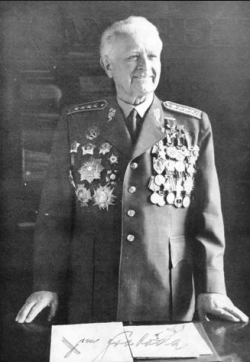Díky za čtení. 
30.3. 1968 President Ludvík Svoboda
Categories: Personalities , Calendar
 He was attracted to the war since childhood, growing up in a peasant family. During the First World War he took part in the battles at Zborov or Bachmač, and during the Second World War at Sokolov. Ludvík Svoboda became President of Czechoslovakia on 30 March 1968.
He was attracted to the war since childhood, growing up in a peasant family. During the First World War he took part in the battles at Zborov or Bachmač, and during the Second World War at Sokolov. Ludvík Svoboda became President of Czechoslovakia on 30 March 1968.
Svoboda was born into a peasant family and had an agronomic education. During World War I he was in the Czechoslovak legions and took part in the famous battles of Zborov, Bachmach and for the Siberian magistracy. After the war, he served in the Czechoslovak Army and was commander of a replacement battalion during the 1938 mobilization. After the occupation, he organized the military resistance and supported Benes as the sole supreme representative of the Czechoslovak resistance. He also organized the 1st Czechoslovak Independent Field Battalion, which grew into a brigade and fought under Svoboda's command at Sokolov and during the liberation of Kiev in the summer of 1944. Svoboda's wife, Irena, was also active, helping officers to get into exile.
But she paid a heavy price for helping the resistance. Her 17-year-old son and brothers were executed. Her mother was gassed in Ravensbrück and fifteen other members of the Svoboda family were imprisoned in the internment camp in Svatobořice. "Svoboda's wife Irena and daughter Zoe managed to escape the Gestapo raid and, with the help of intrepid, extremely self-sacrificing patriots, managed to survive until the end of the war.the end of the war, they hid from the Gestapo's search in Nový Teleček and Džbánice," says Karel Richter in his book Across Bloody Rivers.
After the war in 1952, he was arrested for preparing a military coup. But after Moscow intervened, he was acquitted of all charges. He was a member of the Communist Party and supported the alliance with the USSR because he saw it as a guarantee of state security. He became president on 30 March 1968, choosing the democratisation of society as his priority. He opposed the invasion by Warsaw Pact troops in 1968, but could not influence political events much.
After his first term as president, an ill Husák did not want to continue in office and, after a family meeting, he wrote a letter beginningIn early 1973 he wrote a letter to Husák about his opinion, informing only Lubomír Strougal and Soviet officials about the matter. "However, they reportedly did not agree with Svoboda's departure. Husák then convinced Svoboda to stay on and run for the presidency again, as it was not clear who would replace him," writes Michal Macháček in his book on Gustáv Husák.
Nikolai Viktorovich Podgornyi, chairman of the Supreme Soviet of the USSR, also came to Prague from Moscow to intervene. "There was apparently a fear that a possible dispute over the presidency might destabilise the presidency of the Communist Party of the Soviet Union. Moreover, the personality of General Ludvik Svoboda still enjoyed considerable public support, which contributed to the stability of the whole regime. Gustáv Husák expressed internally in November 1972 that Svoboda, whose health had improved, would be nominated for the presidency again," Macháček adds.
Svoboda was president until 1975. He died on 20 September 1979, and his wife died ten months later...
Michal Machacek: Gustáv Husák, Karel Richter: Over Bloody Rivers, Michal Machacek: Gustáv Husák, www.louny.eu
The article is included in categories:







